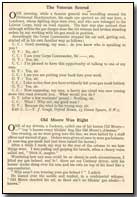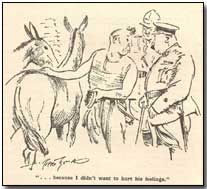Memoirs & Diaries - The Best 500 Cockney War Stories - Old Moore Was Right and Other Stories
 Published in London
in 1921, The Best 500 Cockney War Stories
comprised, in the words of its newspaper publisher (The London Evening
News) "a remembering and retelling of those war days when laughter
sometimes saved men's reason".
Published in London
in 1921, The Best 500 Cockney War Stories
comprised, in the words of its newspaper publisher (The London Evening
News) "a remembering and retelling of those war days when laughter
sometimes saved men's reason".
The collection of short memoirs, some 500 in total, is divided into five categories - Action, Lull, Hospital, High Seas and Here and There. This page contains five stories from Lull, led by Old Moore Was Right.
Other sections within the collection can be accessed using the sidebar to the right.
Old Moore Was Right
One of my drivers, a Cockney, called one of his horses Old Moore - "'cos 'e knows every blinkin' fing like Old Moore's Almanac."
One evening, as we were going into the line, we were halted by a staff officer and warned of gas. Orders were given at once to wear gas helmets.
(A nose-bag gas-mask had just been issued for horses.)
After a while I made my way to the rear of the column to see how things were. I was puffing and gasping for breath, when a cheery voice called out, "Stick it, sargint."
Wondering how any man could be so cheery in such circumstances, I lifted my gas helmet, and lo! there sat my Cockney driver, with his horses' masks slung over his arm and his own on top of his head like a cap-comforter.
"Why aren't you wearing your gas helmet?" I asked.
He leaned over the saddle and replied, in a confidential whisper, "Old Moore chucked his orf, so there ain't no blinkin' gas abaht - 'e knows."
We finished the rest of that journey in comfort. Old Moore had prophesied correctly.
S. Harvey (late R.F.A.), 28 Belmont Park Road, Leyton, E.10
He Wouldn't Insult the Mule
One day, while our Field Ambulance was on the Dorian front, Salonika, our new colonel and the regimental sergeant-major were visiting the transport lines.
They came across a Cockney assiduously grooming a pair of mules - rogues, both of them.
Said the R.S.M.: "Well, Brown, what are the names of your mules?"
Brown: "Well, that one is Ananias, because his looks are all lies. This one is Satan, but I nearly called him something else. It was a toss-up."
With a smile at the C.O., the sergeant-major remarked: " I would like to know what the other name was. Tell the colonel, what was it?"
Brown: "Well, I was going to call him 'Sergeant-Major,' but I didn't want to hurt his feelings."
"Commo" (ex-Sergeant, R.A.M.C.), London, N.1
"Don't Touch 'em, Sonny!"
We had just come back from Passchendaele, that land of two options - you could walk on the duck boards and get blown off or you could step off them yourself and get drowned in the shell-holes.
A draft from home had made us up to strength, and when Fritz treated us to an air raid about eight miles behind the line I am afraid he was almost ignored.
Anyway, our Cockney sergeant was voicing the opinion that it wasn't a bad war when up rushed one recruit holding the chin strap of his tin hat and panting, "Aero—aero—aeroplanes."
The sergeant looked at him for a second and said, "All right, sonny, don't touch 'em."
A flush came to the youngster's face, and he walked away - a soldier.
R. C. Ida, D.C.M. (late 2nd Royal Berks), 39 Hoylake Road, East Acton, W.3
"Ze English - Zey are all Mad!"
Early in 1915 an Anti-Aircraft Brigade landed at Dunkirk. Their guns were mounted in armoured cars, the drivers for which were largely recruited from London busmen.
By arrangement with the French staff it was decided that the password to enable the drivers to pass the French lines should be the French word aviation.
The men were paraded and made to repeat this word, parrot fashion, with orders to be careful to use it, as it was said that French sentries had a nasty habit of shooting first and making any inquiries afterwards.
About a month later I asked my lorry driver how he got on with the word.
"Quite easy, sir," said he. "I leans aht over the dash and yells aht 'ave a ration,' and the Frenchies all larfs and lets me by."
A bit worried about this I interviewed the French Staff Officer and asked him if the men were giving the word satisfactorily.
"Oh," he said, "zose men of yours, zey are comique. Your man, he says somezing about his dinner, and ze ozzers zey say 'Ullo, Charlie Chaplin,' and 'Wotcher, froggy' - all sorts of passwords."
I apologised profusely. "I will get fresh orders issued," I said, "to ensure that the men say the correct word."
"No," replied the French officer, "it ees no use. We know your men now. Ze English will never alter - zey are all mad."
G. H. Littleton (Lieut.-Col.), to Russell Square Mansions, Southampton Row, W.C.1
Mixed History
The Scene: Qurnah, Mesopotamia.
Cockney Tommy - obviously an old Sunday school boy - fed up with Arabs, Turks, boils, scorpions, flies, thirst, and dust: "Well, if this is the Garden of Eden, no wonder the Twelve Apostles 'opped it!"
G. T. C., Hendon, N.W.4
Next - Got His Goat! and four other stories
Russia mobilised 12 million men during the war; France 8.4 million; Britain 8.9 million; Germany 11 million; Austria-Hungary 7.8 million; Italy 5.6 million; and the USA 4.3 million.
- Did you know?

